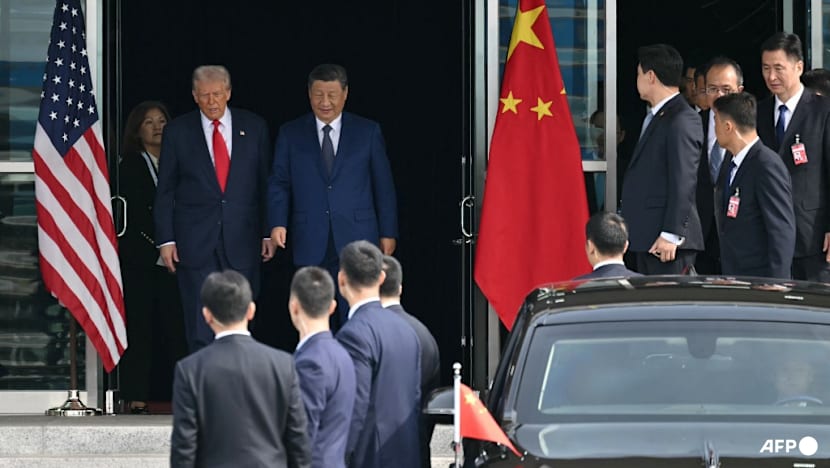Snap Insight: Trump-Xi meeting in Busan cools tensions, but mistrust still runs deep
The outcome of the meeting between Donald Trump and Xi Jinping in Busan signals a de-escalation of tensions, says former US news bureau chief Nirmal Ghosh.

US President Donald Trump and China's President Xi Jinping leave after their talks at the Gimhae Air Base, located next to the Gimhae International Airport in Busan on Oct 30, 2025. (Photo: AFP/ Andrew Caballero-Reynolds)

This audio is generated by an AI tool.
SINGAPORE: The much-anticipated meeting between the leaders of the world’s two largest economies - their first face-to-face in six years - was over in a little over 100 minutes.
United States President Donald Trump rated his meeting with Chinese President Xi Jinping a 12 out of 10. Mr Xi called it a step toward an “important consensus”. There was no joint statement, and both avoided saying anything that might suggest weakness.
Still, the meeting in Busan, South Korea, on Thursday (Oct 30) was of significance. It signalled a de-escalation of sorts following tit-for-tat measures over tariffs and a rare earths dispute that had considerably raised US-China tensions.
Mr Trump told reporters aboard Air Force One as he departed Busan that the meeting had been “amazing” and that he would be visiting China in April 2026.
The brevity of the meeting - shorter than the "three or four hours" Mr Trump had expected - suggested that groundwork on key issues was already prepared, likely at the Oct 25 meeting in Kuala Lumpur on the sidelines of the ASEAN Summit between US Treasury Secretary Scott Bessent and Chinese Vice Premier He Lifeng where in Mr Bessent’s words the two sides reached a "very substantial framework".
WHAT DEALS WERE STRUCK?
Measures signed off on in Busan included China’s pledge to resume purchasing American soybeans; a commitment by China to do more to curb the flow of precursor chemicals used to make the deadly drug fentanyl - a top priority of the Trump Administration - and China’s deferment by a year of restrictions on exports of critical minerals to the US.
China had earlier slashed imports of soybeans from the US, which was hurting a significant part of Mr Trump’s rural base. Resumed imports enable Mr Trump to package the summit as a success.
The American president, in return, reduced tariffs on Chinese goods by 10 percentage points to 47 per cent. The US will also suspend its Section 301 investigation into China's maritime and shipbuilding practices.
Mr Trump made no mention of TikTok after his meeting with Mr Xi, despite speculation that the issue of the ownership of the popular platform was on the agenda.
There was no mention of Taiwan, and Mr Trump later confirmed the topic “never came up”.
A statement from China’s Ministry of Foreign Affairs after the meeting noted that Mr Xi had said that China and the US should be partners and friends. “This is what history has taught us and what reality needs,” he had said, adding: “I am ready to continue working with you to build a solid foundation for China-US relations and create a sound atmosphere for the development of both countries.”
Mr Trump, though flexing America’s muscle ahead of the meeting by greenlighting the Pentagon to resume nuclear tests on par with China and Russia, had also made positive noises on trade in the lead-up to Busan. At an Oct 28 lunch with APEC (Asia-Pacific Economic Cooperation) business executives in Gyeongju, he said that making deals with China was "better than fighting and going through all sorts of problems".
PRAGMATIC ENGAGEMENT
The two presidents have reportedly spoken on the phone three times this year. That, plus the summit in Busan - and now the possible April 2026 meeting in China - indicates that despite a vigorous China hawk lobby in Washington DC, pragmatic engagement with China continues.
But whether this meeting shifts anything structurally in US-China relations remains to be seen.
The US’ baseline view remains that China is a threat to its global dominance, and China resents America’s tariffs and containment strategies. But both sides at least agree on one thing - that neither can afford a real fight, whether over trade or anything else.
Nirmal Ghosh, a former foreign correspondent and US news bureau chief, is an author and independent writer based in Singapore.

















